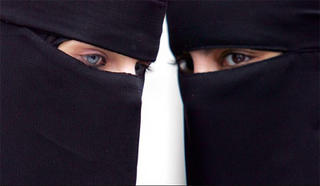The nightmares that fill the Baghdad night

In the 'new Iraq' beloved of Bush and Blair, women can be arrested just for complaining.
Haifa Zangana
May 10, 2006
Iraq: the Women's Story was shown on Channel 4 last night. To protect the identity of the filmmaker, who lives in Baghdad and fears reprisals, she was given the name Zeina.
Zeina had sent me an email before the film was shown, saying:
Dear Haifa, I hope this letter finds you very well, also your family. I am writing to tell you that the film on the Iraqi woman is going to be shown today. I am interested in your opinion. Best and greetings, Zeina.
Immediately after watching the film, I emailed her my opinion. I received two replies. The first was brief:
I am happy you find it excellent. Thanks, Zeina.
PS: Intisar's brother was killed. She found his body in the hospital's fridge. He was slaughtered. She said that she is leaving. Well, sorry to tell you this, but you know how the situation is."
Intisar is the pharmacist who accompanied Zeina while shooting the film in Qaiem.
I did not reply. I could not. Words, just like Iraqi young men, went missing. Kidnapped, shot in the head, killed, slaughtered , tortured, drilled, bound and gagged, bodies, disappeared ... Silence replaced emotions. Silence became our way to mourn our dead: brothers, sisters, fathers, mothers, husbands and children; our unnamed, uncounted dead. Unless ...
Despite my silence, I received her second email this morning:
Thank you, Haifa, I am happy that you still have hope. The resistance, and the spirit of resistance, will go on. History says so. But it tears my heart every moment to see the wonderful Iraqi young men slaughtered like sheep - even worse, like insects.
It tortures me, like all Iraqi mothers, to wait by seconds for my daughters to come back home from college. Nightmares fill our nights. And what is there on the horizon? Nothing. Just dark, bleak pictures of smaller, powerless, backward entities controlled by you-know-who ... This is the future of Iraq ... Actually, there will be no more Iraq: they have to find another name.
I wish I could have more hope; at least to feel better than I do. But I read almost all the Iraqi papers every day. I listen to people talk, and I watch. It is difficult for me to find hope in what I see. As a woman, I can tell you that we have no hope, no matter what.
Sorry again for this very down feeling. I wrote this reply yesterday very late at night but decided not to send it. I thought that maybe I would feel better in the morning and write in a better way. But it was not the night: it was the reality, which is darker than Baghdad's night these days. Well, I think you already know what I've just said. Best, Zeina.
Despite her "very down feeling", I know that Zeina will continue her work. She is one of the few independent journalists still working in Iraq defying the occupation forces as well as their puppet regime, with its sectarian and ethnic militias. More than 100 Iraqi journalists have been killed since the invasion in March 2003. Women journalists, academics, and doctors have not been spared.
Sabah Ali, an independent Iraqi journalist who reports occasionally for the Brussells Tribunal, wrote on May 8:
The Iraqi journalists union published a report and lists of the Iraqi journalists killed in the last three years. The list took five months of working on the ground, documenting when, where, how and by whom the journalists were killed. It is as follows: 69 journalists were killed by militias or unknown armed men; 21 were killed in explosions or fighting; 17 were shot by the American troops; and two were shot by the Iraqi troops.
Sabah Ali also provides us with a list of names of the killed journalists with detailed information regarding the circumstances of their deaths.
On October 27 2004, Liqa Abdul Razaq, a newsreader at al-Sharqiya TV, was shot with her two-month-old baby in the Aldoura district of Baghdad; Layla al-Saad, dean of law at Mosul University, was slaughtered in her house; Maha Ibrahim, editor in chief of Baghdad TV, was killed on July 3 2005, shot by US military gunfire.
The Iraqi journalist Raeda Mohammed Wageh Wazzan of the regional public TV station Iraqiya was found dead on February 25, five days after masked gunmen had kidnapped her and her son in the centre of the northern city of Mosul. She was shot in the head.
The cruel murder of Atwar Bahjat, one of the country's top television journalists, was the latest.
Those women were killed for giving a voice to the voiceless, but other women are differently abused in the "new Iraq". Under the democracy that is still so highly acclaimed by Bush and Blair, women face arrest just for complaining.
Here is an example: On May 3, US forces arrested Sanaa al-Badri, a woman doctor, in Dhuluiya, 25 miles north of Baghdad, a day after she accused US forces of stealing $4,000 (£2,145) in gold during a raid on her house, officials said.
Link Here




0 Comments:
Post a Comment
<< Home